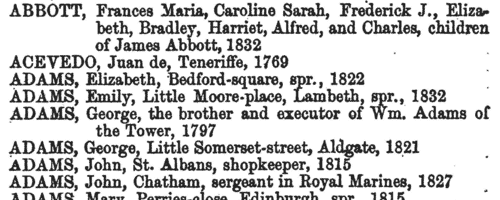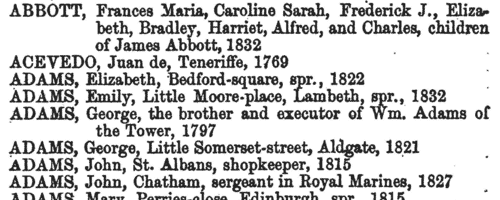Add this eBook to your basket to receive access to all 133 records. Our indexes include entries for the spelling hardiman. In the period you have requested, we have the following 133 records (displaying 71 to 80): These sample scans are from the original record. You will get scans of the full pages or articles where the surname you searched for has been found. Your web browser may prevent the sample windows from opening; in this case please change your browser settings to allow pop-up windows from this site. Missing Next-of-Kin and Heirs-at-Law
(1880)
The Unclaimed Money Registry and Next-of-Kin Advertisement Office of F. H. Dougal & Co., on the Strand in London, published a comprehensive 'Index to Advertisements for Next of Kin, Heirs at Law, Legatees, &c., &c., who have been Advertised for to Claim Money and Property in Great Britain and all Parts of the World; also Annuitants, Shareholders, Intestates, Testators, Missing Friends, Creditors or their Representatives, Claimants, Unclaimed and Reclaimed Dividends and Stock, Citations, Administrations, Rewards for Certificates, Wills, Advertisements, &c., Claims, Unclaimed Balances, Packages, Addresses, Parish Clerks' Notices, Foreign Intestates, &c., &c.' The original list was compiled about 1860, but from materials dating back even into the 18th century: most of the references belong to 1850 to 1880. For each entry only a name is given, sometimes with a placename added in brackets: there may be a reference number, but there is no key by which the original advertisement may be traced. The enquirer of the time had to remit £1 for a 'Full and Authentic Copy of the Original Advertisement, together with name and date of newspaper in which the same appeared'. | Sample scan, click to enlarge

| Money lenders and other creditors
(1880)
Bills of sale transferred title in all property of a debtor to a specified creditor. Possession of a bill of sale thus protected a money lender or other creditor from losing a debtor's property to other creditors (except landlords) in case of insolvency or bankruptcy; and in many cases signing a bill of sale was a required step for a borrower securing a loan. The bill of sale specified the amount thereby secured, but could be open, i. e., allow for further drawings on the same account. Entries from the official register of bills of sales in England and Wales were published in Flint & Co.'s London Manchester and Dublin Mercantile Gazette, a weekly publication available only by subscription, issued under the motto "Security in Crediting". The entries are listed by county, then alphabetically by debtor, surname first, with address, trade, the name of the creditor ('in whose favour'), dates of issue and filing, and amount. An &c. after the amount indicates an open bill. The creditors that appear in the 'in whose favour' column are mainly, but not exclusively, loan companies and individual money lenders, and Jewish names figure prominently among the latter. When a loan was paid off, satisfaction of the bill of sale was entered on the register, and these satisfactions are also recorded in these pages. 1 January to 31 March 1880. | Sample scan, click to enlarge

| Debtors, Insolvents and Bankrupts
(1882)
Bills of sale (binding assets to a creditor/lender), insolvencies and bankruptcies in England and Wales, January to March 1882 | Sample scan, click to enlarge

| Disputed Estates
(1882)
Notices from the Court of Chancery as to the disposition of disputed estates in England and Wales. | Sample scan, click to enlarge

|  Gordon Highlanders fighting in Egypt
(1882) Gordon Highlanders fighting in Egypt
(1882)
The war medal roll for the Egyptian campaign of 1882 is annotated to show those men actually present at Tel-el-Kebir, and thereby also entitled to the Tel-el-Kebir clasp. In addition, there follows an almost duplicate roll of men entitled to the Bronze Star granted by the Khedive of Egypt in recognition of the campaign. The 1st battalion, The Gordon Highlanders, embarked for Malta in 1881; was transferred to Egypt early in 1882, taking part in the 1882 campaign including the battle of Tel-el-Kebir, and in further fighting in 1884. In 1885 the battalion was moved to Malta, and from thence to Ceylon in 1885. This medal roll relates only to the 1882 campaign; it was compiled in Cairo in November 1882 and the medals were issued 30 January 1883. | Sample scan, click to enlarge

| Soldiers' Balances Unclaimed
(1882)
The War Office, under 'The Regimental Debts Act, 1863' compiled and published lists of names of deceased soldiers whose personal estate was held by the Secretary of State for War for distribution amongst the Next of Kin or others entitled. These lists give full name (surname first), rank, regiment, and the amount of the estate unclaimed. During 1882 new lists CXLI to CL relating to recent deaths were issued, as well as republications of lists XCI to CL from previous years showing details of balances still remaining unclaimed. | Sample scan, click to enlarge

| De Bernardy's Unclaimed Money Register
(1883)
This register is divided into three parts, under these headings:
1. 'Unclaimed Money. The following persons, or their representatives, are entitled to property'. This is the part covered by this index.
2. 'Australia. Unclaimed Money. The following persons, who went to Australia, if alive, or if dead their representatives, are entitled to property'. Australia is here understood to include New Zealand.
3. 'America. Unclaimed Money. The following persons, who went to America, if alive, or, if dead, their representatives, are entitled to property'.
In each case there then follows a list of names, alphabetical by surname (in capitals), and some brief circumstantial details, usually with a year, mostly from 1810 onwards, but with a handful of earlier instances. Anyone thinking they might have a claim to one of these estates was invited to send full details to Messrs De Bernardy Brothers, 28, John-street, Bedford-row, London, to further their claim. | Sample scan, click to enlarge

| De Bernardy's Unclaimed Money Register: Australia
(1883)
This register is divided into three parts, under these headings:
1. 'Unclaimed Money. The following persons, or their representatives, are entitled to property'.
2. 'Australia. Unclaimed Money. The following persons, who went to Australia, if alive, or if dead their representatives, are entitled to property'. Australia is here understood to include New Zealand.
3. 'America. Unclaimed Money. The following persons, who went to America, if alive, or, if dead, their representatives, are entitled to property'.
In each case there then follows a list of names, alphabetical by surname (in capitals), and some brief circumstantial details, usually with a year, mostly from 1810 onwards, but with a handful of earlier instances. Anyone thinking they might have a claim to one of these estates was invited to send full details to Messrs De Bernardy Brothers, 28, John-street, Bedford-row, London, to further their claim. | Sample scan, click to enlarge

| Bankrupts, Assignees, Trustees and Solicitors
(1886)
Bankruptcy notices in England and Wales. July to September 1886 | Sample scan, click to enlarge

| Bankrupts, Assignees, Trustees and Solicitors
(1887)
Bankruptcy notices in England and Wales. April to June 1887 | Sample scan, click to enlarge

|
Research your ancestry, family history, genealogy and one-name study by direct access to original records and archives indexed by surname.
|












